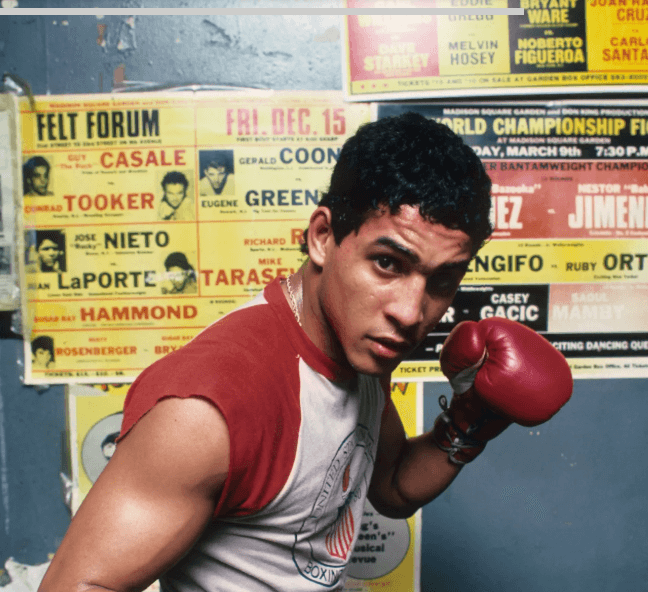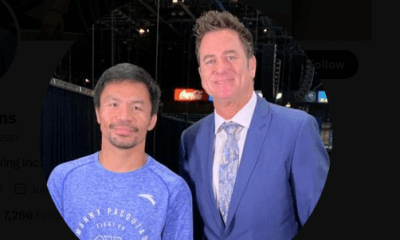Featured Articles
Remembering the Macho Man, Hector Camacho, a Great Sporting Character

Twelve years ago tomorrow, on Nov. 24, 2012, Hector Camacho was officially declared dead. He was effectively dead before then, having suffered a heart attack in the hospital after his spinal cord had been severed by a bullet, but his attendants at the hospital in Bayamon, Puerto Rico, waited until his mother had arrived from New York to remove him from life support.
At the age of 50, one of the most charismatic personalities in the sporting life of America was silenced forever.
Hector “Macho” Camacho, the Macho Man, was flamboyant – boy was he ever – but he was also a great talent. A three-time New York City Golden Gloves champion, reputedly 96-4 as an amateur, he was undefeated in 31 bouts at 135 pounds and below and went on to conquer some of the sport’s biggest names – Boom Boom Mancini, Vinny Pazienza, Roberto Duran (twice), Sugar Ray Leonard – before the sun set on his long career.
Camacho was born in Bayamon but grew up in Spanish Harlem where his mother moved when he was four. He was 21 years old and 21-0 as a junior lightweight when he was first profiled in Sports Illustrated, then the best medium for enhancing the marketability of a young athlete. At this juncture in his life, Hector, who became a father at age 17, was still living in a Spanish Harlem housing project, sharing an apartment with his 38-year-old mother, his stepfather, three siblings, a niece and a nephew.
By then he had already been expelled from six schools and was no stranger to the legal system, having spent 3 ½ months at New York’s notorious Rikers Island for — as Pat Putnam phrased it — borrowing other people’s automobiles without their permission.
The story in S.I. noted that Camacho’s reflexes were so quick that he could play two video games at once. Among his many physical attributes, it was his hand speed that attracted the most attention. When he ramped up his offense, his fists were a blur. But eventually, when folks thought of Camacho, what they remembered was his choirboy face with the spit curl in the middle of his forehead and his outrageous ring costumes which ran the gamut from a loincloth to a dress.
Hot-dogging came natural to Hector Camacho; it was embedded in his DNA. And in common with Muhammad Ali, he could be arrogant without coming across as arrogant. There was an impish quality to his bravado. He was fun to be around and, in his own words, could light up a room like a Christmas tree.
What Camacho lacked was any capacity for embarrassment.
Former WBA super bantamweight champion Clarence “Bones” Adams, who is now the proprietor of a Las Vegas gym that bears his name, became fast friends with the Macho Man when both trained in Las Vegas, the host city for their most lucrative fights. Mention Camacho’s name to Adams and a smile creases his face if he doesn’t burst out laughing.
“One day after Hector and I had gone jogging,” recollects Adams, “we drove over to the old White Cross Drugs [on the north Strip near the Stratosphere] to grab a bite to eat at their lunch counter. When we left and were standing outside by the car, Hector said, ‘Hold on a minute, I have to go pee.’ I said I’ll wait for you but then I noticed he was already peeing. Some cars honked as they passed by.
“Greg Hannely, my manager at the time, and I went to Detroit in 2000 to support Hector who was on the undercard of a show featuring Thomas Hearns. At the weigh-in, Hector wore a long shirt with nothing underneath it. This wasn’t apparent until he stepped off the scale and started doing jumping jacks.
“Hector,” continues Adams, “once had a Ferrari that he misplaced; he couldn’t remember where he parked it. He never did recover that car, but he wasn’t too bothered by it. His attitude was, ‘there’s always more where it came from.’” (Presumably this was the same Ferrari that Camacho was driving when he was ticketed for driving too slow with a suspended license on a Florida highway while being pleasured by a woman sitting astride him.)
Historians would compartmentalize Camacho’s career into two segments. Part One ended with his successful lightweight title defense against Edwin Rosario at Madison Square Garden on June 13, 1986.
Camacho kept his undefeated record intact, prevailing on a split decision, but ended the fight looking as if he had taken all the worst of it. Badly hurt in the fifth round and again in the 11th, he repaired to his dressing room with a swollen nose and two black eyes.
This fight, reads a story in a Canadian paper, “persuaded him to scale back his ultra-aggressive style in favor of a more cerebral, defensive approach.” That’s a diplomatic way of saying that Camacho devolved into a runner.
In his next fight, Camacho proved too clever for Cornelius Boza-Edwards, winning a unanimous decision, but the crowd didn’t like it when Hector spent the last two rounds on his bicycle and there were boos aplenty as the match wended to its conclusion. This would be the Macho Man’s final fight as a lightweight. He moved up to 140 where a slew of attractive match-ups awaited, notably a showdown with Julio Cesar Chavez.
Camacho and Chavez touched gloves in Las Vegas on Sept. 13, 1992, before an announced crowd of 19,100 at the UNLV basketball arena in what reportedly was the fastest sellout in Las Vegas boxing history up to that date. Chavez, widely seen as the top pound-for-pound fighter in the sport, advanced his record to 82-0 with a lopsided decision, winning all 12 rounds on the card of one of the judges. The Macho Man, who had avenged his lone defeat to Greg Haugen, declined to 41-2.
This wasn’t a milquetoast performance by Camacho. He simply couldn’t deal with Chavez’s unrelenting pressure. LA Times scribe Alan Malamud wrote that Hector showed unexpected grit by trading with Chavez after his legs were gone, thereby reducing him to a stationary target. But more brickbats came Camacho’s way following setbacks to Felix Trinidad and Oscar De La Hoya. He lasted the distance in both bouts but was roundly out-pointed. By the third round of the De La Hoya fight, wrote Kevin Iole, it was a foregone conclusion that De La Hoya would win.
Between the Trinidad and De La Hoya fights, staged 44 months apart, Camacho had 21 fights and won them all. His victims were mostly journeyman with two notable exceptions. On June 22, 1996, he scored a 12-round unanimous decision over 45-year-old Roberto Duran. Eight months later, he defeated another faded legend when he stopped Sugar Ray Leonard in the fifth round. Leonard, who had been out of the ring for six years, was forever retiring and unretiring and Camacho retired him for good. Both bouts were in Atlantic City.
A wag wrote that Sugar Ray was 40 years old going on 41 and that Camacho was 35 years old going on puberty.
Camacho’s advisors kept him busy to keep his name in the news and Hector did his part by making the news for bad behavior outside the ring. In January of 2005, he was arrested for the November 2004 burglary of a computer store in Gulfport, Mississippi. He went there to retrieve a laptop that was being repaired but entered the property after hours by way of the ceiling. An illegal drug, ecstasy, was found in his hotel room when he was placed under arrest.
After serving five months in jail, Camacho was released with the understanding that he would be placed under house arrest for one year when he returned to Puerto Rico but, by all accounts, the authorities in Puerto Rico were never notified of this arrangement.
Camacho’s frequent misdeeds, once seen as the amusing antics of a fun-loving man-child, came to be seen in a different light as he grew older; as a pattern of behavior that betrayed a dark side in his personality.
In a 1985 conversation with New York Times boxing writer Michael Katz, Camacho’s estranged manager Billy Giles said, “someday he’ll wind up like Tyrone Everett, maybe worse,” the reference to a talented junior lightweight from Philadelphia who was murdered under sordid circumstances.
That proved to be eerily prophetic.
Camacho had 20 more fights after his hollow performance against Oscar De La Hoya, ending his career as a bloated middleweight. His only noteworthy opponent during this final phase of his boxing career was Duran who was then 50 years old when they clashed in Denver. In a bout that echoed their first meeting, Hector won a unanimous decision. This was Roberto Duran’s farewell fight. Camacho soldiered on for eight more bouts, winning five.
In November of 2012, thirty months after his last ring assignment, Hector Camacho and a companion were ambushed as they sat in a car in the darkened parking lot of a Bayamon, Puerto Rico bar. The companion died instantly in the hail of bullets. Police found nine packets of cocaine on the decedent and an open packet of cocaine in the car.
Camacho’’s funeral was held at Harlem’s landmark Saint Cecilia’s Church. Hundreds of mourners stood in the cold outside the church as his casket was being placed in the funeral car. They cheered and shouted Camacho’s battle cry, “Macho Time,” as the hearse pulled away.
They say you shouldn’t speak bad about the dead, so we will let Bones Adams have the last word. “Hector had his demons,” says Adams, “but he was a great friend, a nice, kind, and caring guy.”
—
Editor’s note: For more on Hector Camacho, check out Christian Giudice’s biography, “Macho Time: The Meteoric Rise and Tragic Fall of Hector Camacho,” published by Hamilcar in 2020.
To comment on this story in the Fight Forum CLICK HERE
-

 Featured Articles3 weeks ago
Featured Articles3 weeks agoVito Mielnicki Jr Whitewashes Kamil Gardzielik Before the Home Folks in Newark
-

 Featured Articles4 days ago
Featured Articles4 days agoResults and Recaps from New York Where Taylor Edged Serrano Once Again
-

 Featured Articles1 week ago
Featured Articles1 week agoFrom a Sympathetic Figure to a Pariah: The Travails of Julio Cesar Chavez Jr
-

 Featured Articles3 days ago
Featured Articles3 days agoResults and Recaps from NYC where Hamzah Sheeraz was Spectacular
-

 Featured Articles4 weeks ago
Featured Articles4 weeks agoCatching Up with Clay Moyle Who Talks About His Massive Collection of Boxing Books
-

 Featured Articles1 week ago
Featured Articles1 week agoCatterall vs Eubank Ends Prematurely; Catterall Wins a Technical Decision
-

 Featured Articles4 days ago
Featured Articles4 days agoPhiladelphia Welterweight Gil Turner, a Phenom, Now Rests in an Unmarked Grave
-

 Featured Articles3 weeks ago
Featured Articles3 weeks agoMore Medals for Hawaii’s Patricio Family at the USA Boxing Summer Festival



















